
Living in Mexico offers affordability, rich culture, and healthcare savings, but experiences vary by background.
Whether reclaiming roots, securing benefits for kids, or planning retirement, your path depends on your legal status and family ties. Here’s what to know before moving.
For some, Mexico means reconnecting with heritage. For others, it’s about financial relief, easier access to healthcare, or a new chapter in retirement. But the reality is different for every person. U.S.-born children of Mexican parents, families correcting vital records, spouses seeking residency, or retirees looking for community all face unique processes and opportunities.
We’ve guided thousands of Mexican-American families through these exact journeys, often succeeding where consulates or traditional firms failed.
Because when it comes to citizenship and residency, the right support makes the difference between rejection and approval.
If you want the complete breakdown of costs, visas, safety, property rules, and insider tips for making Mexico your new home, keep reading.
Why People Choose to Live in Mexico
Mexico has become one of the top destinations for U.S. citizens seeking a new chapter abroad. The reasons go beyond sunshine and tacos; living here can transform your financial, cultural, and personal life.
1. Lower Cost of Living
In many cities, daily life is around 50% cheaper than in the U.S.. Housing, groceries, and transportation stretch your dollars further, making it possible to live comfortably on a modest income.
Retirees and remote workers especially benefit from this cost advantage.
2. Affordable, High-Quality Healthcare
Mexico’s healthcare system blends modern private hospitals with lower costs for consultations, surgeries, and prescriptions.
Many doctors are trained internationally, and expats often find they can access quality care without breaking the bank.
3. Geographic Closeness
For U.S. citizens, Mexico is just a short flight, or even a drive, away. This proximity makes it easier to stay connected with family, maintain cross-border careers, or split time between two countries.
4. Cultural Richness
Life in Mexico means immersing yourself in vibrant traditions, world-famous cuisine, lively music, and a family-centered way of life.
For those with Mexican roots, it’s also a powerful way to reconnect with identity and heritage.
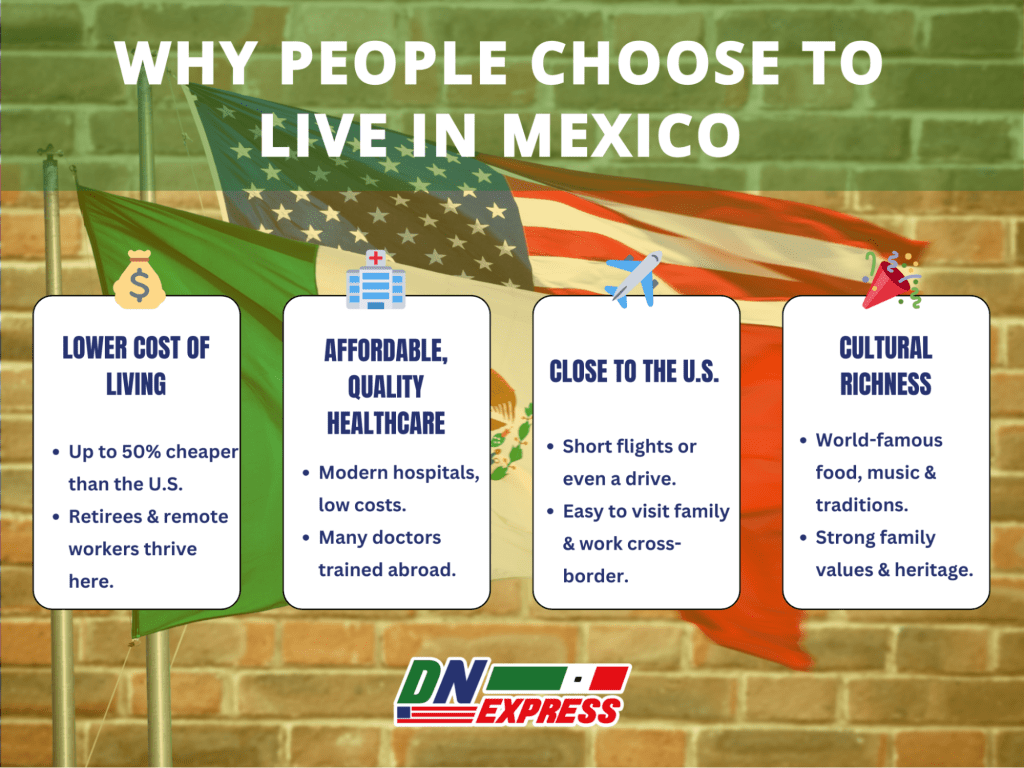
Is Mexico a Good Place to Live?
For many U.S. citizens, the answer is yes. Mexico consistently ranks as one of the easiest countries for foreigners to settle in. International surveys place it high for “ease of settling in,” thanks to its welcoming communities, strong expat networks, and family-oriented culture.
What About Safety?
Safety is often the first question people ask. Like anywhere, crime exists, but most risks mirror U.S. urban patterns. The U.S. Department of State provides updated information for travelers.
Avoiding high-risk areas, steering clear of drug-related activity, and practicing the same precautions you’d use in a big U.S. city go a long way.
Safest Places to Live
Expats consistently highlight Mérida, San Miguel de Allende, and Querétaro as among the safest and most livable towns in Mexico. These cities combine cultural richness with lower crime rates and established expat communities.
Everyday Realities
Beyond crime statistics, some expats mention day-to-day quality-of-life issues. Reddit threads often highlight loud fireworks, street noise, and even pet welfare as ongoing concerns.
These are cultural norms, not safety threats, but they can impact comfort levels depending on where you choose to live.
Cost of Living in Mexico
One of the biggest draws for U.S. citizens is Mexico’s affordability. On average, living costs are 40–60% lower than in the United States, depending on location and lifestyle.
Average Monthly Budgets (Mexico City example):
- Single person: around $1,500 USD (including rent, food, and transport).
- Family of four: about $2,600 USD.
Coastal vs. Inland Costs
Coastal towns like Playa del Carmen or Puerto Vallarta can be more expensive, especially for housing in tourist areas. By contrast, inland cities such as Guadalajara or Puebla offer lower rent and daily costs while still providing modern amenities.
Hidden Costs to Watch For
Reddit users frequently mention surprise add-ons in service quotes, from construction projects to home repairs. Always request line-item breakdowns before agreeing to prices to avoid unpleasant budget overruns.
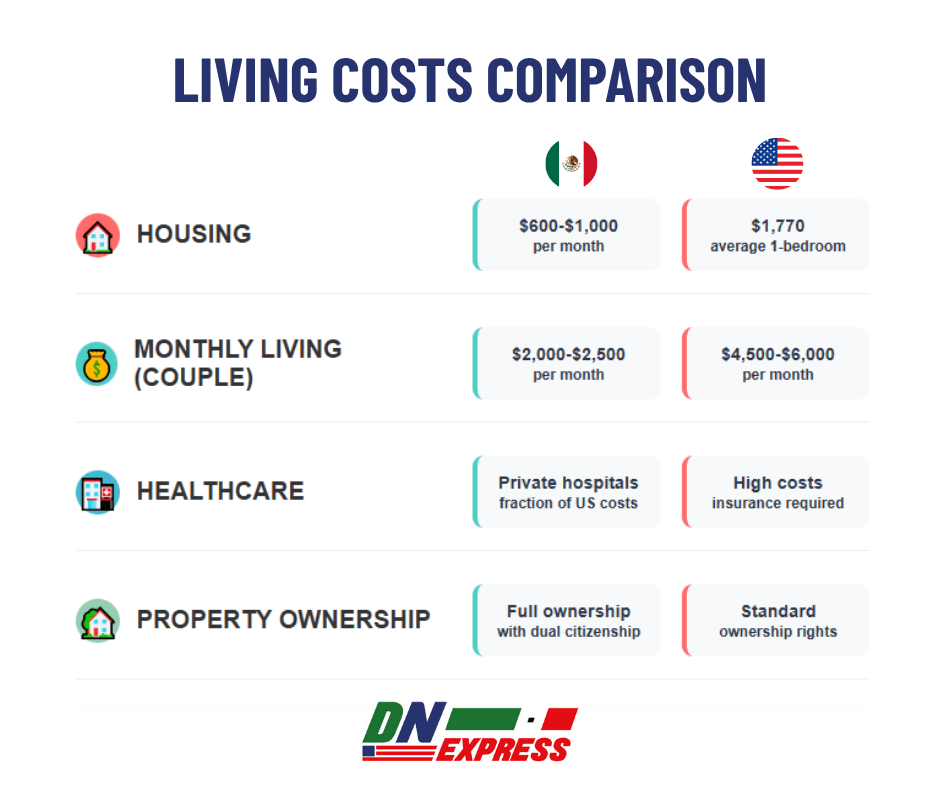
Healthcare in Mexico
Healthcare is one of the top reasons U.S. citizens move to Mexico. The country offers quality care at a fraction of U.S. prices, making it attractive for retirees, families, and remote workers alike.
Private Hospitals
Mexico is home to modern private hospitals where many doctors are U.S.-trained or internationally certified. Facilities in Mexico City, Guadalajara, and Monterrey are especially known for advanced technology and English-speaking staff.
Public Options
Residents can also access public programs like IMSS (employment-based) and INSABI (general coverage). These systems offer extremely low-cost services, though wait times may be longer than in private hospitals.
Medication Access
Many medications that require a prescription in the U.S. are available over-the-counter in Mexico, and at much lower prices. This makes managing long-term conditions far more affordable.
Is Healthcare Affordable in Mexico?
Yes. A specialist visit may cost $30–$50 USD, and surgeries are often thousands less than in the U.S. That said, most expats recommend carrying private insurance for faster service, better facilities, and peace of mind.
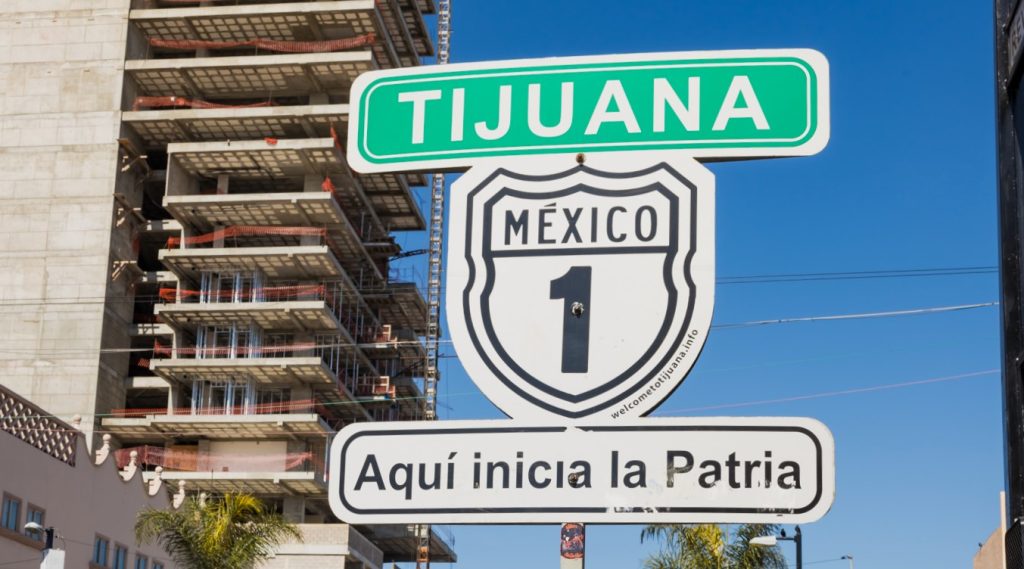
Residency, Citizenship, and Legal Paths
For U.S. citizens, moving to Mexico involves choosing the right legal pathway. Residency and citizenship options vary, and the process can feel overwhelming without proper guidance.
Temporary Residency
This is the most common first step, valid for 1–4 years and renewable. It’s ideal for retirees, remote workers, or spouses beginning their temporary residence stay.
Permanent Residency
Often granted through retirement, economic solvency, or family ties, permanent residency allows you to stay indefinitely and eventually apply for Mexican citizenship.
Why Choose Doble Nacionalidad Express?
Our attorneys specialize in helping clients secure dual citizenship and residency without consulate visits. This is a key step for families who face long wait times, unresponsive consulates, or confusing requirements.
We fix rejected cases, resolve mismatched records, and save clients from wasted trips.
Common DIY Pitfalls
- Mismatched names on U.S. and Mexican records.
- Rejections due to missing documents.
- Endless delays caused by incorrect consulate scheduling.
Reader Question: Can Americans Just Move to Mexico?
Yes, but only as visitors. To stay long-term, you’ll need temporary or permanent residency, usually based on income, savings, marriage, or Mexican heritage.
Housing & Property in Mexico
Finding a place to live in Mexico comes with its own rules and cultural norms. Getting familiar with these early can save you time, money, and stress.
Renting Norms
Most landlords require a fiador (a local co-signer who owns property) or a póliza jurídica (a legal insurance policy that replaces a co-signer). If you’re new to Mexico, expect to pay a larger deposit or work with specialized rental services that cater to foreigners.
Buying Property as a Foreigner
Yes, you can own property in Mexico. In restricted coastal and border zones, foreigners purchase through a fideicomiso, a trust held by a Mexican bank that gives you full rights to sell, rent, or inherit the property.
Outside restricted zones, you can buy directly in your name.
Work, Income & Retirement in Mexico
For most U.S. citizens, the key to living comfortably in Mexico is earning in dollars and spending in pesos. This exchange-rate advantage allows expats to maintain or even upgrade their lifestyle.
Remote Work Stability
Remote jobs tied to U.S. companies or freelance clients abroad provide the best financial stability. With reliable internet in most mid-to-large cities, digital professionals can thrive while enjoying Mexico’s lower cost of living.
Local Wages
While some foreigners seek local employment, wages in Mexico are significantly lower than in the U.S. Redditors often caution newcomers: unless you have specialized skills or bilingual fluency, relying on local jobs can make it difficult to sustain the lifestyle you expect.
Social Security Abroad
Good news for retirees: U.S. citizens can collect Social Security while living in Mexico. Direct deposit options make it simple, and with lower costs for housing and healthcare, retirement income often goes much further.
Retirement Hotspots
Popular destinations include:
- Lake Chapala: Known for its large expat community and mild climate.
- Mérida: Safe, cultural, and affordable with top healthcare.
- San Miguel de Allende: Artistic, colonial charm with a thriving international scene.
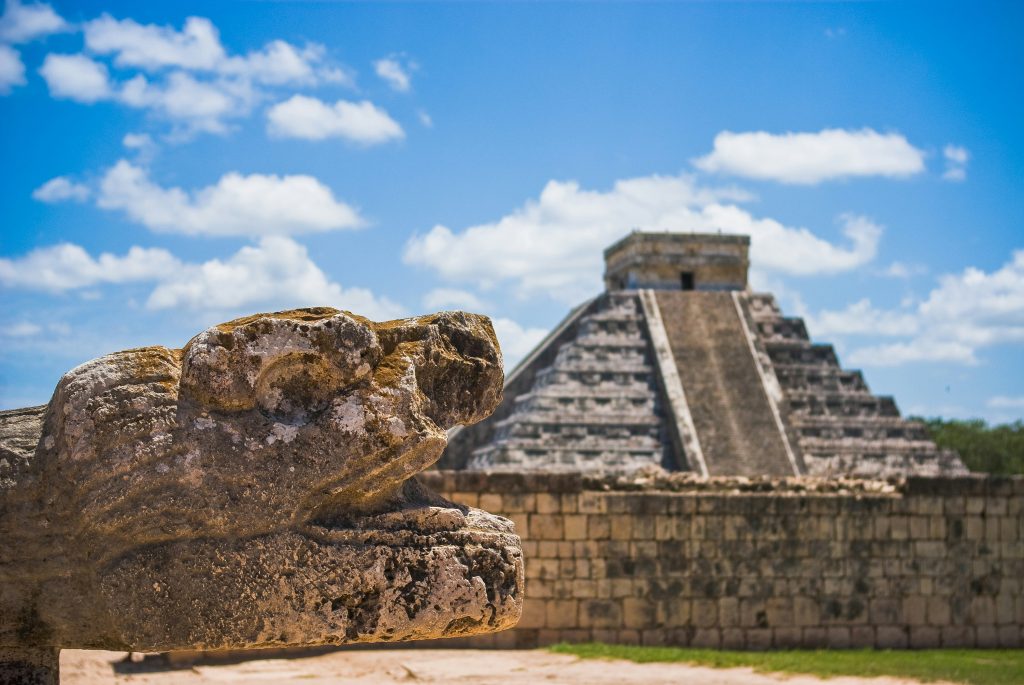
Cultural Adjustments to Expect
Moving to Mexico means embracing new cultural rhythms that shape everyday life.
Time & Social Norms
“Mexican time” often means flexibility. Meetings may start late, and social gatherings flow at a slower pace. Personal space is smaller than in the U.S., and tipping, 10–15% in restaurants, is standard.
Class vs. Race
Expats on Reddit note that in Mexico, class divisions often matter more than race. Wealth gaps are visible, and upward mobility through local wages is limited. Acknowledging these dynamics helps newcomers interact respectfully in work and social settings.
Noise Culture
One of the biggest shocks for long-term expats is noise. Fireworks, church bells, street vendors with loudspeakers, and neighborhood fiestas are part of daily life.
While colorful and cultural, they can affect comfort, especially for those seeking peace and quiet. Choosing neighborhoods or housing with thicker walls and double windows can help.
Worries About Living in Mexico
When planning a move to Mexico, certain questions come up again and again. Here are the most frequent ones, with clear answers to help you decide if life in Mexico is right for you.
How much money do I need to live comfortably?
A single person can live well on $1,500–$2,000 USD per month, while families often budget $2,600+ depending on the city and lifestyle.
What’s the nicest part of Mexico to live in?
It depends on what you value:
- Mexico City (CDMX): Cosmopolitan, with jobs, culture, and nightlife.
- Mérida: Safe, quiet, and family-oriented.
- San Miguel de Allende: Expats and artists, colonial beauty.
Can I buy property as a foreigner?
Yes. Foreigners can buy through a fideicomiso (bank trust) in coastal/border areas, or directly outside those zones.
What are the cons of moving to Mexico?
The most cited challenges include noise, bureaucracy, and navigating class divides. While not dealbreakers for most, they are worth preparing for.
Can I rent or buy without speaking Spanish?
Yes, especially in expat hubs, but fluency in Spanish helps lower costs, avoid misunderstandings, and negotiate better deals.

Why Choose Doble Nacionalidad Express
Navigating Mexican residency and citizenship alone can be frustrating. We’ve built a reputation for making the process fast, reliable, and stress-free.
What Makes Us Different
✅ Licensed Mexican attorneys, not simply document processors.
✅ Remote process; secure your dual citizenship or residency without a single consulate visit.
✅ Affordable, transparent pricing with flexible payment plans.
✅ Experience with complex cases; we specialize in fixing errors, rejections, and difficult applications that others can’t resolve.
Why Not DIY?
❌ Long waits for consulate appointments.
❌ Risk of costly mistakes and paperwork rejections.
❌ Mismatched records between the U.S. and Mexico leading to denials.
Next Steps for Your Journey
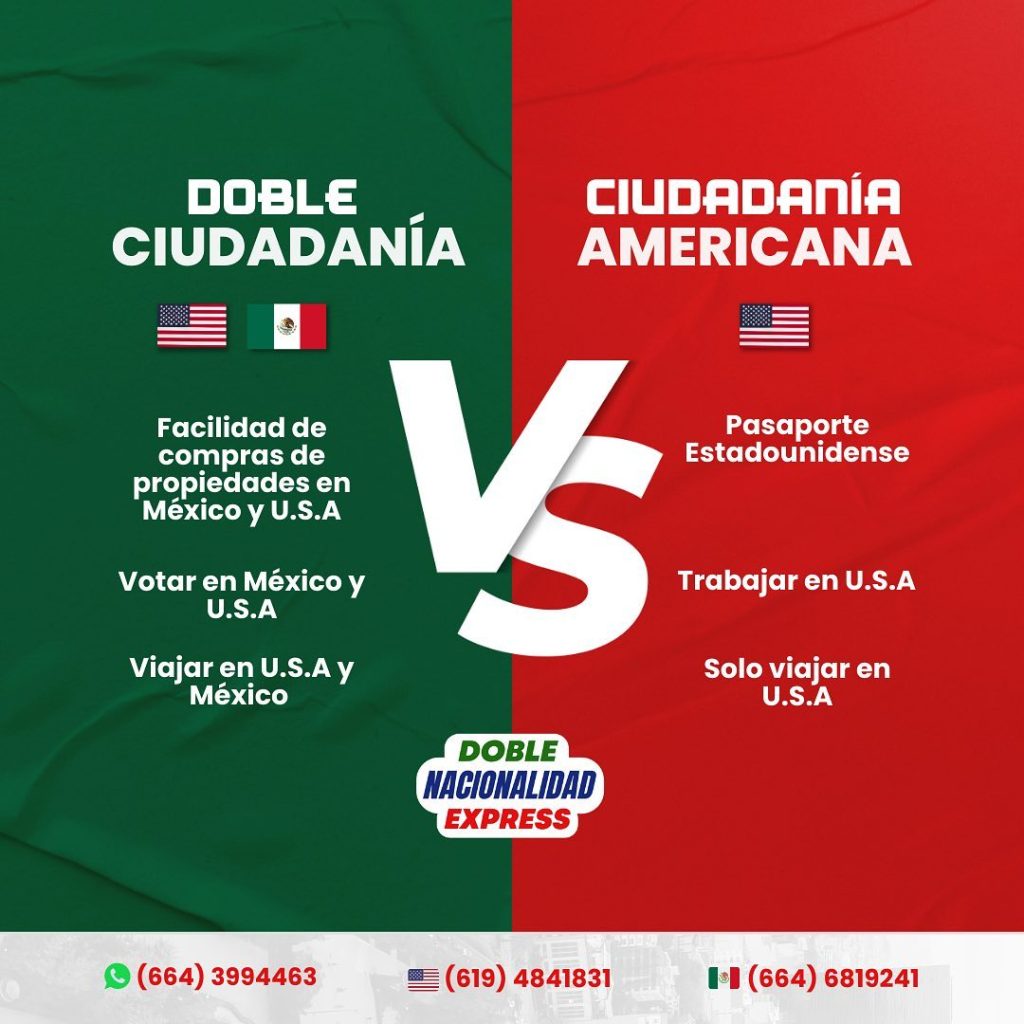
Ready to make Mexico part of your life? Here’s how to begin:
- Call for a Schedule a Free Case Review or Message Us on WhatsApp: Speak directly with our licensed attorneys to identify your best path, whether it’s dual citizenship, residency, or correcting vital records.
- Send Your Documents Securely: Choose the method that works best for you: mail them to our U.S. or Mexico offices, or upload them digitally through our secure portal.
- Get Support Every Step of the Way: We’re available daily via WhatsApp, email, or phone to answer your questions and guide you through the process.
Don’t wait months for a consulate appointment. Start your process today. With our firm, you can move forward quickly and confidently, knowing your case is in capable hands.
Frequently Asked Questions About Living in Mexico
Can U.S. citizens live in Mexico long-term?
Yes. You’ll need temporary or permanent residency, usually through income, savings, marriage, or Mexican heritage.
Is healthcare in Mexico really affordable?
Absolutely. Doctor visits cost a fraction of U.S. prices, and private insurance ensures faster service and modern facilities.
Can I buy property in Mexico as a foreigner?
Yes. In coastal and border areas, purchases are made through a fideicomiso (bank trust). Elsewhere, you can buy directly.
How much money do I need to retire comfortably in Mexico?
Most retirees live well on $1,500–$2,500 USD per month, depending on city and lifestyle choices.
What are the downsides of moving to Mexico?
Frequent challenges include bureaucratic delays, everyday noise (fireworks, loudspeakers), and navigating class divides.
Is It Cheaper to Live in Mexico Than the U.S.?
Yes. Housing, healthcare, groceries, and domestic services are significantly less expensive. While imports and electronics may cost more, most families and retirees report that their money stretches much further in Mexico.
Is It Better to Rent or Buy in Mexico?
We recommend renting first, especially for expats new to the country. Renting gives you time to explore neighborhoods, gauge noise levels, test commutes, and see if the city fits your lifestyle.
Once settled, buying property can be a smart investment, particularly in growing markets like Querétaro, Mérida, or parts of Mexico City.



